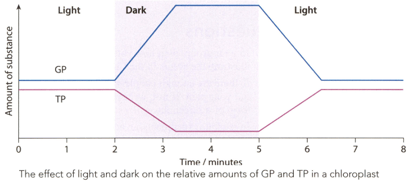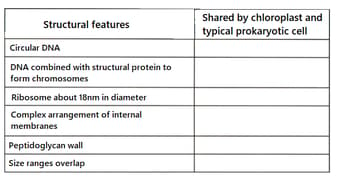HARD
AS and A Level
IMPORTANT
Earn 100
In separate experiments, an actively photosynthesising plant was supplied with one of two labelled reactants:
- water containing the 18O isotope of oxygen.
- carbon dioxide containing the 17O isotope of oxygen.
In which products of photosynthesis would these isotopes be found?
(a)
| 18O | 17O |
| Oxygen produced by chloroplast grana | Carbohydrate produced by the chloroplast stroma |
(b)
| 18O | 17O |
| Oxygen produced by chloroplast stroma | Carbohydrate produced by the chloroplast grana |
(c)
| 18O | 17O |
| Carbohydrate produced by the chloroplast grana | Oxygen produced by chloroplast stroma |
(d)
| 18O | 17O |
| Carbohydrate produced by the chloroplast stroma | Oxygen produced by chloroplast grana |
50% studentsanswered this correctly

Important Questions on Photosynthesis
MEDIUM
AS and A Level
IMPORTANT
Explain why the Calvin cycle stops running when there is no light and the TP (triose phosphate) is used up.
HARD
AS and A Level
IMPORTANT
The following graph shows the effect on the levels of GP (glycerate 3-phosphate) and TP (triose phosphate) in a chloroplast when it is exposed to light, dark and then light again. Describe and explain these results.

MEDIUM
AS and A Level
IMPORTANT
Which stage of the photosynthesis is limited by light intensity? Explain.
MEDIUM
AS and A Level
IMPORTANT
Which stage of the photosynthesis is limited by temperature? Explain.
MEDIUM
AS and A Level
IMPORTANT
Which stage of the photosynthesis is limited by carbon dioxide concentration? Explain.
HARD
AS and A Level
IMPORTANT
Explain how the inner membrane system of a chloroplast make it well adapted for photosynthesis.
HARD
AS and A Level
IMPORTANT
Copy the table below and insert ticks and crosses to show which structural features are shared by a plant chloroplast and a typical prokaryotic cell.
 = structural feature shared;
= structural feature shared;  = structural feature not shared
= structural feature not shared

HARD
AS and A Level
IMPORTANT
When isolated chloroplasts are placed in buffer solution with a blue dye such as DCPIP or methylene blue and illuminated, the blue colour disappears. Explain this observation.
